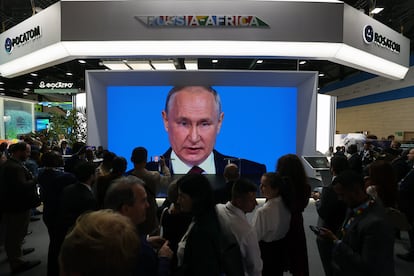Prigozhin, a necessary collaborator in Putin’s Africa policy
The Russian leader is trying to seduce African countries at a summit held in Saint Petersburg where the Wagner Group’s boss made an appearance

Vladimir Putin wants to transform Russia into the leading global power on the African continent, both economically, politically and culturally. The Russian president also wishes to position his country at key geographical points for a new geostrategic configuration that would give Moscow a privileged outlet into the Red Sea, the Persian Gulf and the Indian Ocean.
These are some of the main ideas outlined by Putin during his speech at the Russia-Africa Forum held on Thursday and Friday in Saint Petersburg.
The goals that Putin has set for himself in Africa can only be assessed based on results, but it can already be said that his ambitious objectives in the previous forum did not match the reality. In 2019 in Sochi, before 45 African heads of state and government, Putin said that Russia’s trade volume with this continent was $20 billion in 2018. Now, in Saint Petersburg, he stated that the trade volume was $18 billion in 2022, that is, it fell by $2 billion in four years. However, Putin considered the figure a success. “This is one of the obvious results of the Russia-Africa summit in Sochi,” he said in St. Petersburg.
The core message of the 2019 summit —the first of its kind— was the return to Africa of the former Soviet Union (reincarnated into Russia) in the role of a liberating, anti-colonial power that was ready to help the new African states to establish themselves in the world. In this second edition, the emphasis has changed and Putin has worked hard to show that Russian grain (not Ukrainian) can save Africa from famine. The Kremlin leader has been full of promises, including free grain supplies for Burkina Faso, Mali, Zimbabwe, Somalia and the Central African Republic. His seduction plans include energy development projects and hydrocarbon exploitation by large Russian companies. Also, expanding the teaching of the Russian language, as well as technological and military cooperation.
It remains to be seen how Russia’s projects in Africa will compete with those of China and the West. The Saint Petersburg forum is also being attended by Yevgeny Prigozhin, the architect behind the Wagner mercenary units, who for years has maintained a feverish economic and military activity in Africa. Prigozhin was photographed in the company of the representative of the Central African Republic. Agentstvo, a social media outlet, analyzed the photograph that was apparently taken on the steps of a hotel belonging to Prigozhin’s family in St. Petersburg. The meeting with the Central African representative was confirmed by GreyZone, a channel that broadcasts Wagner’s information. Earlier, in an interview with African media, Prigozhin denied rumors that Wagner is leaving Africa.
The presence of the so-called Kremlin’s chef at the Saint Petersburg forum indicates that he is someone who is necessary for Russian policy in Africa, and that his practical value for Moscow outweighs his responsibility for last June’s rebellion, which Putin described as “treason” in his first public statement on the subject and apparently weighs more than the lives of 15 Russian pilots and the planes shot down as they flew over the columns of the mutineers. Prigozhin also outweighs his own methods to maintain discipline in his ranks, including a hammer blow to the skull.
The Russian State finances Wagner’s activities, as Putin has acknowledged after years of opacity, although in African countries the leader of the mercenary company was already seen as part of that State. After the June mutiny, Foreign Minister Sergei Lavrov stated that, apart from the Wagner company, the governments of the Central African Republic and Mali “have official government contacts with our leaders.” The head of Russian diplomacy recalled that “several hundred soldiers work as instructors in the Central African Republic.” Various Western media have warned of trips by Russian officials to Mali, viewed as an attempt to calm things down in that country. Russia is planning to build a technical assistance base for its ships off the coast of Sudan, and in addition to providing free grain to Somalia, it has intense military and technical cooperation with Eritrea.
Among the projects to bring Russia closer to Africa is also the development of hockey, a proposal that was made by the deputy head of the Moscow hockey federation, Boris Rotenberg, who is part of Putin’s circle of friends from his youth, and has built the bridge over the Kerch Strait that connects the occupied Ukrainian peninsula of Crimea with Russia.
Sign up for our weekly newsletter to get more English-language news coverage from EL PAÍS USA Edition
Tu suscripción se está usando en otro dispositivo
¿Quieres añadir otro usuario a tu suscripción?
Si continúas leyendo en este dispositivo, no se podrá leer en el otro.
FlechaTu suscripción se está usando en otro dispositivo y solo puedes acceder a EL PAÍS desde un dispositivo a la vez.
Si quieres compartir tu cuenta, cambia tu suscripción a la modalidad Premium, así podrás añadir otro usuario. Cada uno accederá con su propia cuenta de email, lo que os permitirá personalizar vuestra experiencia en EL PAÍS.
¿Tienes una suscripción de empresa? Accede aquí para contratar más cuentas.
En el caso de no saber quién está usando tu cuenta, te recomendamos cambiar tu contraseña aquí.
Si decides continuar compartiendo tu cuenta, este mensaje se mostrará en tu dispositivo y en el de la otra persona que está usando tu cuenta de forma indefinida, afectando a tu experiencia de lectura. Puedes consultar aquí los términos y condiciones de la suscripción digital.









































